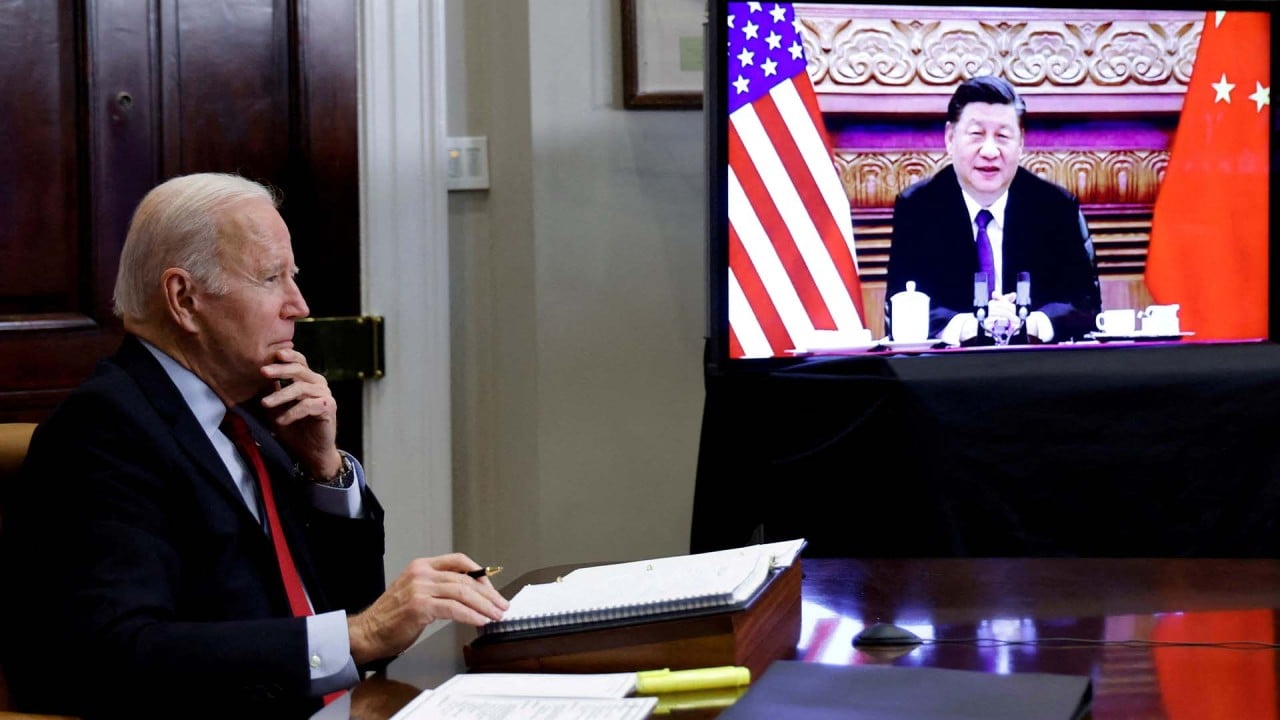
03:13
Xi warns Biden that US ‘playing with fire’ as tensions soar over Pelosi’s proposed Taiwan visit

The US is using Hong Kong’s national security law as another battlefront in its anti-China crusade, and this is causing distress to countries trying to stay out of the fight.
The latest salvo was fired last month when the US Congressional-Executive Commission on China (CECC) urged President Joe Biden to “consider targeting additional sanctions to those engaged in political prosecutions in Hong Kong”.
In the CECC’s version of events, President Xi Jinping is portrayed as an autocratic ruler bent on quashing democracy by packing Hong Kong dissidents off to prisons, or worse, to be tortured in mainland China.
This narrative, like all others from the US, is formulated through the prism of a liberal democratic value system. This is understandable, given that such values make up America’s ideological DNA, and are part of a wider US-led Western campaign against autocracy.
However, each country has its own DNA, and no one country has a monopoly on values. Nor are relationships between different value systems necessarily always binary in nature.
An understanding of Hong Kong’s storied past is crucial for a balanced appreciation of its current predicament. The political arguments have been well covered by the media, but less so is the impact of US politics on ordinary Hong Kong people who are trying to lead normal, honest lives.
Hong Kong was a British colony for 156 years, but it has been an integral part of China for more than 2,000 years. This history dates back to the Qin dynasty when China was unified for the first time; for a while, Kowloon City was even the seat of the Southern Song dynasty Imperial court.
As a crown colony, Hong Kong went through rapid industrialisation, but social development lagged behind, resulting in widespread inequality. The left-wing riots of 1967 left 51 dead, but they served as a catalyst for socioeconomic reforms, and the ensuing stability paved the way for Hong Kong’s rise as one of the “Four Asian Dragons”. Colonial Hong Kong prospered and was the envy of countless Chinese across the border.
Chinese leaders are keen and astute students of history. Since 1997, their overarching aim has been to find a way to reconcile Hong Kong’s two historical realities, namely, its 2,000-year sovereignty under China, and its socioeconomic success as a crown colony.
The key to a smooth transition is stability, and this has required China to juggle ideology and pragmatism. It is how the “one country, two systems” principle came into being, and these elements continue to be juggled in tandem with shifting geopolitical forces.
Tearing the social fabric of Hong Kong would have caused instability, which runs counter to Beijing’s stated fundamental objective for Hong Kong. Indeed, even events like the Tiananmen vigil continued post-handover, despite the use of slogans like “end one-party dictatorship”, and it was only cancelled in 2020 owing to public health concerns about the spread of Covid-19, according to official accounts.
By the same token, the 2019 protests, initially peaceful, were only put down when they began to turn violent and tear at the social fabric of Hong Kong. To exacerbate matters, certain protesters advocated for revolution and independence; and some politicians and public figures even rallied for support from the US.
Due to its openness and global links, Hong Kong had, and continues to have, a profound influence on China that belies its size, and which goes far beyond its role as a gateway for international trade and investment.
Hong Kong is where Sun Yat-sen plotted to overthrow the Qing dynasty, and patriots shipped weapons in the fight against Japanese occupation. Post-handover, Hong Kong is where China polishes its statecraft in balancing “one country, two systems”, and in recent years, the site where China defends its sovereign rights in the US-China contest.
The reality is that Hong Kong’s fate is inextricably linked with that of mainland China. Hong Kong people who embrace Western liberal democratic values are resolutely, and understandably, opposed to the national security law, and some have even gone so far as to risk criminal prosecution rather than compromise their beliefs.
This story of defiance is well documented by Western media, but it is just one side. There are also Hong Kong people, typically less vocal, who denounce violent protests and recognise the need to curtail some freedoms; and these are the people who applaud Hong Kong’s return to stability. This is the less-told story.
At the end of the day, a red line is crossed when protesters support or resort to violence to impose their demands, and it is incumbent on any government to protect its people, its sovereignty and its constitution.
China and Hong Kong are not alone in having to contend with national security issues. The US is currently dealing with the aftermath of the January 6 Capitol attack of 2021; the Democrat-controlled House of Representatives has already impeached Donald Trump for “incitement of insurrection”, and House Speaker Nancy Pelosi even described him as “a clear and present danger”.
Meanwhile, Trump, who is the only US president to be impeached twice, insists that he is the subject of political persecution, and that the January 6 committee consists of “political hacks and thugs”.
Perhaps Biden summed it up best last week when he told Trump, who according to one poll still enjoys an 80 per cent favourability rating among Republicans, that “you [Trump] can’t be pro-insurrection and pro-American”.
The world would be a safer place, and “in-between” countries would breathe easier, if the US could engage, not confront, China over Beijing’s own belief that “you can’t be pro-insurrection and pro-Chinese”.
Lub Bun Chong is a partner of C Consultancy and Helios Strategic Advisors, and the author of “Managing a Chinese Partner: Insights From Four Global Companies”